
2012 Lifetime Achievement Award Recipients
The Honorable J. Patrick Brazil, 1962
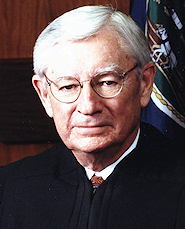 The Honorable J. Patrick Brazil, 1962, grew up in Chanute, Kansas, graduating from high school in 1953. He attended Chanute Junior College before entering Rockhurst College in Kansas City, Missouri, where he graduated with a bachelor's degree in business administration in 1957. Upon graduation from Washburn Law in 1962, he practiced law in Pratt until 1968 when he moved to Eureka and entered practice with Carl Chase. He was later joined in practice by his law school classmate, Ronald Myers, and they practiced together until his appointment to the district court in 1972. He served as a judge of the 13th Judicial District until 1985 when he was appointed to the Kansas Court of Appeals. He became chief judge of the Court in 1995 and served until his retirement in January 2001. He has since worked as a senior judge for the Kansas appellate courts and has been associated with Larry Rute as a mediator and arbitrator for Associates in Dispute Resolution, LLC.
The Honorable J. Patrick Brazil, 1962, grew up in Chanute, Kansas, graduating from high school in 1953. He attended Chanute Junior College before entering Rockhurst College in Kansas City, Missouri, where he graduated with a bachelor's degree in business administration in 1957. Upon graduation from Washburn Law in 1962, he practiced law in Pratt until 1968 when he moved to Eureka and entered practice with Carl Chase. He was later joined in practice by his law school classmate, Ronald Myers, and they practiced together until his appointment to the district court in 1972. He served as a judge of the 13th Judicial District until 1985 when he was appointed to the Kansas Court of Appeals. He became chief judge of the Court in 1995 and served until his retirement in January 2001. He has since worked as a senior judge for the Kansas appellate courts and has been associated with Larry Rute as a mediator and arbitrator for Associates in Dispute Resolution, LLC.
Judge Brazil has served on several committees of the National Conference of State Trial Judges, including a committee that updated the American Bar Association time standards for trial courts which were adopted by the ABA and many states. He was a member of the Kansas Continuing Legal Education Commission from its creation in 1985 until 1991. He is also an original member and past president of the Sam A. Crow Inn of Court. Judge Brazil has been a member of the Commission on Judicial Qualifications since 1984, serving as chairman from 1991 to 1994. During that time he has been a member or chairman of a commission committee that studied and made major recommendations on two occasions to the Supreme Court for the revision of the Code of Judicial Conduct. Both were adopted by the Court; one in 1995 and the other in 2009. Judge Brazil and his wife, Char, reside in Topeka and have two living children.
B.S., Rockhurst College, 1957 • J.D., Washburn University School of Law, 1962
The Honorable Dale E. Saffels, 1949
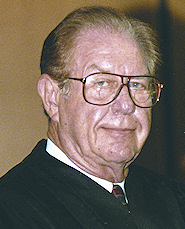 The Honorable Dale E. Saffels, 1949, was appointed judge of the U.S. District Court, District of Kansas, in 1979 and continued to hear cases as a senior judge until his death in November 2002. Speaking at his memorial service, Michael Hegarty, one of his former law clerks and a long-time friend, recalled four of Judge Saffels' finest traits: Christian faith, love of family, friendship, and fidelity to his oath.
The Honorable Dale E. Saffels, 1949, was appointed judge of the U.S. District Court, District of Kansas, in 1979 and continued to hear cases as a senior judge until his death in November 2002. Speaking at his memorial service, Michael Hegarty, one of his former law clerks and a long-time friend, recalled four of Judge Saffels' finest traits: Christian faith, love of family, friendship, and fidelity to his oath.
Judge Saffels' career was one marked by public service. As a young man during World War II, he was a major in the U.S. Army Signal Corps before completing his education at Emporia State University and Washburn University School of Law. Upon graduation, he entered private practice in Garden City in 1949 and two years later was elected county attorney of Finney County, Kansas, a position he held for four years. For the next eight years, he served in the Kansas House of Representatives, the last two years as minority leader before winning the Democrat Party's nomination for governor in 1962.
Judge Saffels was a member of the Kansas Corporation Commission from 1967 to 1975, serving as chairman from 1968 to 1975. He was in private practice in Wichita when President Jimmy Carter nominated him to the federal bench in 1979. Judge Saffels' fidelity to his oath was well known. "Not only did Judge Saffels believe that the law should be administered impartially, but also that it must be done expeditiously. If ever a person lived by the motto that justice delayed is justice denied, it was Judge Saffels," Hegarty said. "He always carried a big case load. Even after he became a senior judge (in 1990), which meant he could reduce his case load if he wanted, he kept the same busy docket as an active judge. He had an outstanding work ethic."
Judge Saffels served from 1974 to 1975 and from 1977 to 1982 on the Washburn Law School Association Board of Governors. He was awarded the inaugural alumnus of the year award by Washburn Law students in 1983 and received the Distinguished Service Award from the Washburn Law School Association in 1987.
Born: August 13, 1921 - Topeka • Died: November 14, 2002
B.A., Emporia State Teachers College, 1947 • J.D., Washburn University School of Law, 1949
The Honorable Edward R. Sloan, 1906
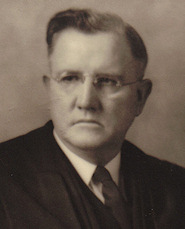 The Honorable Edward R. Sloan, 1906, was born in Seward County, Nebraska. His family came to Kansas in 1886, locating in Sheridan County. He attended Kansas State Agricultural College of Manhattan, (now Kansas State University) for one year. He then began law studies at Campbell College School of Law at Holton in 1902 and received an LL.B. there in 1904. However, Campbell's program lasted only two years and the Kansas Board of Law Examiners required a three-year course before taking the bar exam. Sloan thus entered Washburn with advanced standing in 1904 and graduated in 1905.
The Honorable Edward R. Sloan, 1906, was born in Seward County, Nebraska. His family came to Kansas in 1886, locating in Sheridan County. He attended Kansas State Agricultural College of Manhattan, (now Kansas State University) for one year. He then began law studies at Campbell College School of Law at Holton in 1902 and received an LL.B. there in 1904. However, Campbell's program lasted only two years and the Kansas Board of Law Examiners required a three-year course before taking the bar exam. Sloan thus entered Washburn with advanced standing in 1904 and graduated in 1905.
While still in law school, Edward, or Ted as he was known to many, ran for and was elected county attorney of Sheridan County in the fall of 1904. He named the opponent he defeated to act as his deputy until he was eligible to take the bar exam in 1905. He was re-elected county attorney twice while maintaining a private practice in Hoxie, Kan.
In July 1911, Sloan established with Guy L. Hursh the Holton law firm of Hursh & Sloan. In April 1912, Sloan was appointed city attorney of Holton, a position he held for 19 years. He also served as president of the Holton Board of Education. In 1930, Sloan helped establish the Topeka firm of Sloan, Hamilton and Sloan, which included his younger brother Floyd and W. Glenn Hamilton. It was the predecessor of the firm of Sloan, Listrom, Eisenbarth, Sloan & Glassman.
Sloan was elected or appointed to six public offices, including three terms in the Kansas House of Representatives from 1923 to 1929. In March, 1931, he was appointed by Governor Guy Woodring to fill a vacancy on the Kansas Supreme Court. Justice Sloan served the remaining 21 months of the term but opted not to seek election for another term. Instead, he chose to practice law with the Sloan firm he had helped found with his brother.
Justice Sloan later was appointed to the Kansas Corporation Commission and served as chairman from 1936 to 1938. In 1947, he was appointed Referee in Bankruptcy for the District of Kansas, where he served for 14 years. As a lecturer at the law school, he compiled his own textbook on bankruptcy. Justice Sloan had extensive family ties to the law school, as two sons, a brother and a nephew all became Washburn Law graduates.
Born: March 12, 1883 - Seward County, Nebraska • Died: January 29, 1964 - Topeka
LL.B., Washburn University School of Law, 1906
The Honorable William A. Smith, 1914
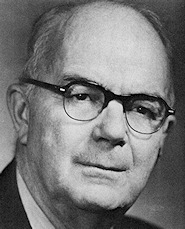 The Honorable William A. Smith, 1914, grew up in Valley Falls, Kansasa, where his high school principal encouraged him to become active in the literary and debating societies. After graduating from high school in 1910, he attended Washburn University School of Law and was admitted to the bar the same year he received his law degree. He began practicing law in Valley Falls, Kan., where he soon announced his candidacy for Jefferson county attorney. He lost that election but immediately began preparing for the next one. His plans changed when he enlisted on June 22, 1916, in Company B of the Second Regiment Kansas Volunteer Infantry. As a citizen soldier, he served in Texas along the Mexican border. While serving his country, his friends actively campaigned for him and he was subsequently elected Jefferson county attorney. He served as county attorney briefly before he was summoned for military service again, this time in France in the fall of 1918 where his unit engaged in the battle of Argonne in the last few months of World War I.
The Honorable William A. Smith, 1914, grew up in Valley Falls, Kansasa, where his high school principal encouraged him to become active in the literary and debating societies. After graduating from high school in 1910, he attended Washburn University School of Law and was admitted to the bar the same year he received his law degree. He began practicing law in Valley Falls, Kan., where he soon announced his candidacy for Jefferson county attorney. He lost that election but immediately began preparing for the next one. His plans changed when he enlisted on June 22, 1916, in Company B of the Second Regiment Kansas Volunteer Infantry. As a citizen soldier, he served in Texas along the Mexican border. While serving his country, his friends actively campaigned for him and he was subsequently elected Jefferson county attorney. He served as county attorney briefly before he was summoned for military service again, this time in France in the fall of 1918 where his unit engaged in the battle of Argonne in the last few months of World War I.
Upon his return from military service, he was appointed assistant attorney for the Kansas Utilities Commission by Governor Henry Allen. From 1922 to 1926, he served as assistant attorney general. In 1926, Smith ran for attorney general, the only one of seven candidates to denounce the Ku Klux Klan. He was elected and then re-elected in 1928. During his tenure as attorney general, Smith continued to oppose the Klan and worked to revoke its corporate charter, thus ousting it from the state.
He became a Kansas Supreme Court Justice in 1930, a position in which he served 26 years, and was chief justice for 10 months in 1956. At the time of his resignation from the court due to illness, Justice Smith had written more than 1,000 opinions. He was a part-time lecturer on Public Utilities at Washburn Law for two years shortly after joining the Court. For many years, he and his wife, Ada, lived across the street from Washburn where they often rented rooms to law students.
Justice Smith was the first of three generations of Washburn lawyers. Two sons and two grandchildren have also graduated from Washburn Law.
Born: December 30, 1888 - Valley Falls • Died: July 22, 1968 - Topeka
LL.B., Washburn University School of Law, 1914
The Honorable H. George Templar, 1927
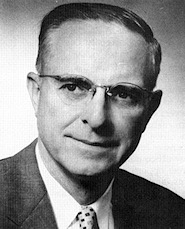 The Honorable H. George Templar, 1927, was born October 18, 1904, on the Magnolia Ranch, which is located in southern Kansas near Arkansas City. His parents had been given shelter on the ranch when their farm was inundated by floodwaters. Templar grew up on a farm, helped with chores, and attended a country school. Later, as a student at Arkansas City High School, he played on the football team. He had not planned to attend college because he knew his parents could not afford it. But upon learning that a football scholarship was available at Washburn College, he decided to apply. He was overjoyed when he learned he had been awarded the scholarship. He supplemented his scholarship with income from a job as a motorcycle policeman for the City of Topeka, working nights as a patrolman.
The Honorable H. George Templar, 1927, was born October 18, 1904, on the Magnolia Ranch, which is located in southern Kansas near Arkansas City. His parents had been given shelter on the ranch when their farm was inundated by floodwaters. Templar grew up on a farm, helped with chores, and attended a country school. Later, as a student at Arkansas City High School, he played on the football team. He had not planned to attend college because he knew his parents could not afford it. But upon learning that a football scholarship was available at Washburn College, he decided to apply. He was overjoyed when he learned he had been awarded the scholarship. He supplemented his scholarship with income from a job as a motorcycle policeman for the City of Topeka, working nights as a patrolman.
After completing the pre-law course required at Washburn, he entered Washburn University School of Law in the spring of 1925, and graduated in 1927, with a LL.B. degree cum laude. He returned to Arkansas City in the summer of 1927 and established a law practice.
While continuing to practice law, he served in the Kansas House of Representatives (1933-41) and, later, in the Kansas Senate (1945-53). He served as U.S. Attorney for the District of Kansas from 1953 to 1954. Later in 1954, he ran unsuccessfully as a Republican candidate for governor. In 1962, he was appointed U.S. Judge for the District of Kansas by President John F. Kennedy. He took senior status in 1974, continuing to hear cases until 1985. He served in other districts needing judicial assistance and, by assignment, on the Court of Appeals in the 7th, 9th, and 10th Circuits. In 1985, Judge Templar closed his office in Topeka and moved, with Helen, his wife of more than 60 years, back to their hometown of Arkansas City.
Among the many honors he received during his lifetime were the Award of Merit from the International Trial Lawyers Association–the highest honor it bestows on a nontrial lawyer–and the Honorary Doctor of Law degree from Washburn Law. He died of heart failure on August 5, 1988, at the age of 83.
Born: October 18, 1904 - Arkansas City, Kansas • Died: August 5, 1988 - Arkansas City
LL.B., Washburn University School of Law, 1927